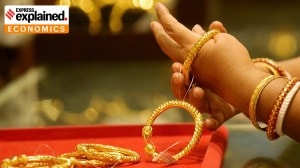Cricket can be fun: watch the minnows play
The world cup came to life on Tuesday night. No, it wasn’t Waqar’s beamers, nor Andrew Symonds’s batting. The action for me w...

The world cup came to life on Tuesday night. No, it wasn’t Waqar’s beamers, nor Andrew Symonds’s batting. The action for me was in Durban, where Bangladesh played Canada. Not many people could have stayed up to watch the match (though thankfully the Kingsmead had a fair smattering of spectators); those who did got their money’s worth.
And when Austin Codrington, West Indian by birth, walked up to receive the man of the match award from the legendary Michael Holding, the awe in the young fast bowler’s face was a delight to see. This is what the world cup is all about.
True, the cricket wasn’t of the highest quality — though Parthiv Patel must be happy that Ashish Bagai emigrated. And true again, it wasn’t David against Goliath, more like David against David Senior. But that just emphasises my point: it wasn’t going to be a giant-killing act to make headlines in the world of cricket, just another victory. But that was important enough for Canada.
When they went out to field, they knew 180 was a modest total to defend, eminently gettable for Bangladesh. A couple of wickets later, though, and the spirit of the side lifted visibly; with every subsequent success, they knew they were a step closer to an improbable win and raised their game accordingly. The eventual 60-run margin didn’t flatter them; it was a tribute to their self-belief and spirit.
The moments before Davison caught the last man seemed to last an eternity: you could see the entire team holding its breath, willing the ball to fall safely into his hands. Then the celebrations: Codrington dancing around, skipper Harris, marshalling limited resources in a manner Stephen Fleming would be proud of, gathering his boys together and planning the party ahead.
There are those — a large majority, I would presume — who feel that the minnows — Namibia, Bangladesh, Canada, Holland — have no place in the world cup. Rubbish. This is what the world cup is all about: where those with less ability get a chance against the giants and plot their way to gianthood. Ask Sri Lanka, who won the trophy 15 years after emerging from the shadows of associate membership (and who really gained acceptance into the Big Boys’ Club only after that win). Ask India, too, whose win at Lord’s came just eight years after that embarrassing first match against England in 1975.
Last year, I was privileged enough to watch two of the more stirring matches at the football world cup. Those were the games in which the two hosts recorded their first wins, South Korea against Poland and Japan against Russia. The scenes before, during and after were unforgettable. And, of course, it was that spirit that took the Koreans to the semi-finals.
Indeed, the giant-killing was a theme throughout the tournament — Turkey, Senegal, USA, the co-hosts exceeded everyone’s expectations and salvaged a tournament almost done in by the disappointing French and Argentinians. Eventually, order was restored with the two biggest footballing countries making the finals and the biggest of them all winning it. That’s football for you.
Actually, that’s sport for you. Beyond the politics of regional quotas, beyond the smell of big money and the faint stench of overwhelming corporitisation, the purity of sport has a way of shining through. Some of that purity — the sheer joy of playing cricket for cricket’s sake — was on show at Durban last night; there’ll be more before the tournament is through.






- 01
- 02
- 03
- 04
- 05

























